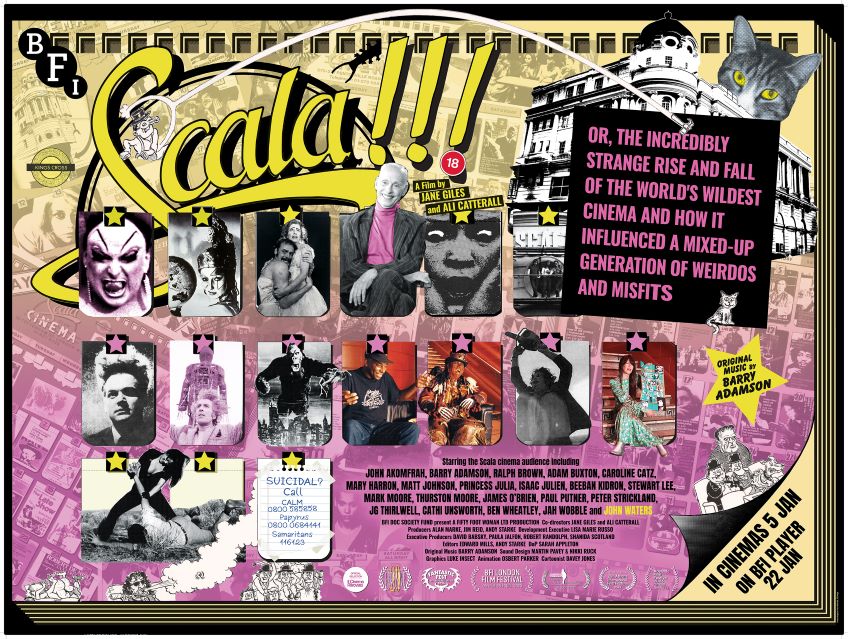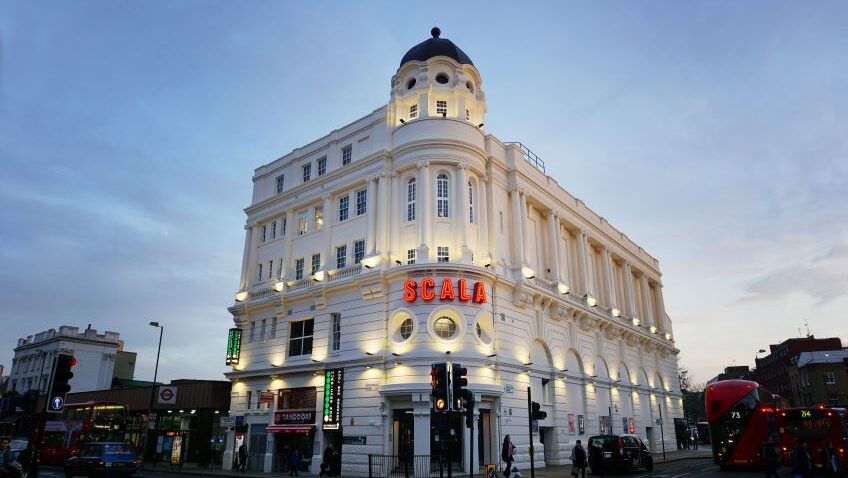Joyce Glasser reviews Scala!!! (January 5, 2024) Cert 18, 96 mins.
The full title of the BFI and crowd-funded documentary Scala!!! is “Scala!!! Or The Incredibly Strange Rise And Fall Of The World’s Wildest Cinema And How It Influenced A Mixed-up Generation Of Weirdos And Misfits.” That is an apt summary of this occasionally riotous (the 18 rating is not only because of the clips), atmospheric, kaleidoscopic history of the country’s grubbiest repertory cinema.
Directors Jane Giles (a former Scala programmer who wrote the definitive book on the cinema) and Ali Catterall tell the story with generous archive footage, film clips, interviews with writers, musicians, former club members, programmers and filmmakers including John Waters, Ben Wheatley and Peter Strickland. The anecdotes go a long way toward recreating the experience at the white Disney-like palace in the heart of seedy Kings Cross, but you know that nothing compares with having been there.
Founded in 1978 by the prolific British producer, Stephen Woolley (The Crying Game, Mona Lisa) to be an alternative to the National Film Theatre, the Scala Film Club’s early history is sketched in a rapidly edited prologue that is hard to follow with subtitles that are a challenge to read. The format of a long lineup of talking heads jumping from subject to subject can grow tiring, but mainly the film is a lot of fun with great clips, priceless anecdotes and deadpan comic delivery.

The cinema moved from Scala House on Tottenham Street to its grand venue in the middle of King’s Cross in 1981 where it earned the nickname Sodom Odeon. Passing the addicts, pimps and pushers on the way there was not always the scariest part of the evening and Scala dutifully fulfilled its mission as an alternative film venue until 1993.
There were other repertory cinemas, but nothing compared to Scala for its innovative and eclectic programming that made fitting it all on the programme guide a graphic artist’s challenge. The films changed daily and programmes included double bills, triple bills, live gigs and the infamous Saturday Shock Around the Clock All Nighters – a precursor to the tame London Fright Fest.
Cult films like Laurel and Hardy classic comedies and David Lynch’s Eraserhead were juxtaposed with Russ Meyer’s Faster, Pussycat! Kill! Kill! and James Bidgood’s mostly 8mm Pink Narcissus, which, allegedly inspired by The Red Shoes, visualises the erotic fantasies of a gay male prostitute. But nothing in the stockpile compared with Curt McDowell’s legendary 1975 Thundercrack, which is described as starting out like a Rocky Horror Picture Show and turning into hard porn. Interestingly, The Academy Film Archive has seen fit to preserve a few of Curt McDowell’s films (he died of AIDS in 1987), including Beaver Fever and Peed into the Wind.
We hear about Walter Hill’s film The Warriors that, shortly after its release in 1979, caused so much violence that the distributor released cinemas from their contractual obligation to show the film. But audiences at Scala couldn’t get enough of it. One former club member recalls a screening at about three in the morning. ‘On this particular night the audience had memorised the film – it was a Brechtian moment when we were totally engaged.’
The history is told against the background of Thatcher’s Britain, as Scala was a haven for those who didn’t fit in her world. You could be openly gay, an activist, or a drop out and find people like you there. Amphetamines were available at the back of the bar, although many were not interested in staying awake. During the all-nighters, the auditorium was used as a cheap hotel, where Mary Harron recalls, “the movies and the dreams merged.”

As one interviewee points out “you didn’t go just to see the films, you went to see the audience.” Another interviewee adds, “it smelled weird, it was cold, the floors were sticky and the seats were uncomfortable,” but no one seemed to mind. Well, some did, as toward the end the place became progressively sleazier and you could encounter the odd syringe in the bathroom.
But Scala’s heart was in the right place, and Jim McSweeney, of Gay’s The Word Bookshop on Marchmont Street remembers how the cinema threw a fund raiser for the bookshop after it was raided by HM Revenue & Customs in 1984 and thousands of books were removed. There were many other benefit evenings for a variety of causes.
Scala’s demise was ironic, but also sad, as it was triggered by Stanley Kubrick, whose film, A Clockwork Orange was a Scala favourite. The trouble is the film had been withdrawn from UK distribution Scala were showing it illegally. Kubrick insisted that Warner Bros sue the cinema for breach of copyright. Scala, which never chased profits, was quickly bankrupted.
The iconic building still exists and, after a makeover which exorcised the ghosts from the old building, it operates as a music and film venue, but the old magic is gone. Scala was a landmark in British cinema or, more precisely, London’s cultural history and it can never be revived: only remembered.




